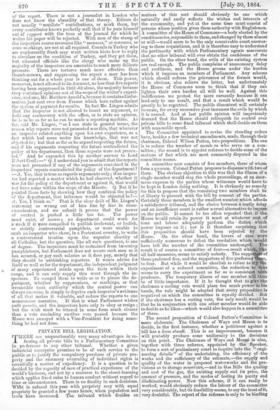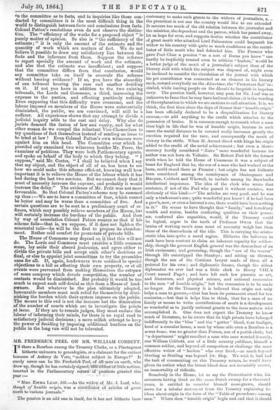PRIVATE BILL LEGISLATION.
THERE are unquestionably very many advantages in re- ferring all private bills to a Parliamentary Committee in preference to any other tribunal. Whether a given industrial enterprise promises to be of such service to the public as to justify the compulsory purchase of private pro- perty and the summary overruling of individual rights is essentially a matter of expediency. It is a question to be decided by the sagacity of men of practical experience of the world's business, and not by a recourse to the closet-learning which applies fixed rules to human conduct without regard to time or circumstances. There is no finality in such decisions. "Wilt is refused this year with propriety may with equal propriety be granted a few years hence, when population and trade have increased. The tribunal which decides on matters of this sort should obviously be one which- naturally and easily reflects the wishes and interests of
the community, and yet at the same time musteonsist of persons whose position gives them authority with Englishmen. A committee of the House of Commons—a body elected by the constituencies, responsible to them, and changed by them almost at will—would seem to be the only conceivable court answer- ing to these requisitions, and it is therefore easy to understand the pertinacity with which Parliamentary agents asseverate that no other tribunal will ever obtain the confidence of the public. On the other hand, the evils of the existing system
are real enough. The public complains of unnecessary delay and costliness, and the House groans under the burden which it imposes on members of Parliament. Any scheme which should redress the grievances of the former would, it is obvious, also relieve the latter, but unfortunately the House of Commons seem to think that if they can lighten their own burden all will be well. Against this indifference we protest the more earnestly because it can lead only to one result, and that a result which would be greatly to be regretted. The public discontent will certainly increase, for every successive year increases the evils by which it is caused. And at last public opinion will imperiously demand that the House should relinquish its control over private bills to some fixed tribunal which shall decide on them with reasonable speed.
The Committee appointed to revise the standing orders have, besides a few technical amendments, made, through their chairman, Colonel Wilson Patten, two propositions. The one is to reduce the number of members who serve on a com- mittee ; the second is to appoint referees to decide some of the matters of fact which are most commonly disputed in the committee-rooms.
A committee now consists of five members, three of whom form a quorum. Colonel Patten proposes to dispense with two of them. The obvious objection to this was that the illness of a single member would stop the whole proceedings, at an enor- mous expense to the parties whose witnesses would have to be kept in London doing nothing. It is obviously no remedy for this to propose that the remaining two members shall be at liberty to proceed with the bill by consent of the parties. Certainly three members is the smallest number which affords a satisfactory tribunal, and the choice between a costly delay and an insufficient court is rather a cruel alternative to impose on the public. It cannot be too often repeated that if the House would retain its power it must at whatever cost of time and labour adequately perform the • duties which power imposes on it ; nor is it therefore surprising that this proposition .should have been rejected- by the House. On the 'other hand, the lovers of ease were sufficiently numerous to defeat the resolution which would have left the number of the committee unchanged. The result is of course a committee of four—a result which,' like all half-measures, seems to satisfy nobody. The suppor*s of three preferred five, and the supporters of five preferred ihvee, to four. But while it would be churlish to refuse to try' the experiment of a reduced committee, the reduction to four seems to carry the experiment as far as is consistent with prudence. The temporary illness of one member will then be of little importance. If it be thought that to give the chairman a casting vote would place too much power iu his hands, the rule might be adopted that every proposition is negatived on which the committee is equally divided. But if the chairman has a casting vote, the only result would be that he in conjunction with one other member would be able to decide as he likes—which would also happen in a committee of three.
The second proposition of Colonel Patten's Committee is more elaborate. The Chairman of Ways and Means is to decide, in the first instance, whether a petitioner against a bill has a locus standi. This is an improvement, because it will probably produce some uniformity in the decisions on this point. The Chairman of Ways and Means is also, together with three referees, appointed by the Speaker, to form a sort of preliminary court to inquire into the "engi- neering details" of the undertaking, the efficiency of -the works and the sufficiency of the estimate,—the supply and quality of the water in proposed waterworks and the pro- visions as to storage reservoirs,—and in Gas Bills the quality and cost of the gas, the existing supply and its price, the amount of pressure, and the modes of testing its purity and illeninating power. Now this scheme, if it can really be worked, would obviously reduce the labour of the committee very considerably, but its feasibility seems, to say the least of it, very doubtful. The report of the referees is only to be binding on the committee as to facts, and in inquiries like those con- ducted by committees it is the most difficult thing in the world to distinguish between facts and conclusions from facts. Colonel Patten's resolutions even do not observe the distinc- tion. The " efficiency of the works for a proposed object " is purely matter of opinion. So also is "the sufficiency of the estimate ; " it is only the amount of the estimate and the quantity of work which are matters of fact. We do not believe it possible to draw any satisfactory line between the facts and the inference from them. Suppose the referees to report specially the amount of work and the estimate, and also that the estimate was insufficient ; and suppose that the committee differs from. that conclusion, would any committee take on itself to overrule the referees without heating evidence ? If so, you have the absurdity of one tribunal hearing the case and another deciding on it. If not you have in addition to the two existing tribunals, the Lords and Commons, a third, increasing the expense to the parties, and effecting positively nothing. Even supposinc, that this difficulty were overcome, and the labour imposed on members of the House were substantially diminished, the public, we are convinced, will still be a sufferer. All experience shows that any attempt to divide a judicial inquiry adds to the cost and delay. Why else do• jurists demand the fusion of law and equity, and for what other reason do we compel the reluctant Vice-Chancellors to try questions of fact themselves instead of sending an issue to be tried at law ? Even Colonel Patten's own witnesses were against him on this head. The Committee over which he presided only examined two witnesses besides Mr. Frere, the examiner of petitions. They were both Parliamentary agents, and spoke on behalf of the body to which they belong. " I suppose," said Mr. Coates, " I shall be believed when I say that my object, and the object of all of us, has been to see how we could make this scheme efficient, knowing well how important it is to relieve the House of the labour which it has had during the last two sessions. But we cannot deny that it must of necessity increase the expense, and probably it would increase the delay." The evidence of Mr. Pritt-waa not more favourable. So that Colonel Patten's scheme may be summed up thus :—We are to have a committee of fourovhich cannot be better and may be worse than a committee of five. And certain questions are to be sent to a prelimium7 court of re- ferees, which may possibly relieve members of the House, but will certainly increase the burdens of the public. And then by way of consolation Colonel Patten assures us that if his scheme fails—that is, we suppose, if it does not lighten the senatorial toils—he will be the first to propose its abandon- ment. Rather cold comfort for promoters of private bills. The House of Commons may depend on it that this will not do. The Lords and Commons must exercise a little common sense, lay aside their absurd jealousigs, and agree either to divide the private bills and accept each other's decisions as final, or else to appoint joint committees to try the preambles once for all. If, again, landowners wcre confined to special objections to a bill as affecting their own property, or at all events were prevented from making themselves the catspaw of some company which dreads competition, the number of contests would be diminished. But probably it would be too much to expect such self-denial as this from a House of land- owners. But whatever be the plan ultimately adopted, honourable members must seek relief for themselves by dimi- nishing the burden which their system imposes on the public. The means to this end is not the increase but the diminution of the number of courts which arc to investigate the points at issue. If they are to remain judges, they must endure the labour of informing their minds, for there is no royal road to satisfactory judicial decisions ; a mere selfish attempt to keep the power of deciding by imposing additional burdens on the public in the long run will not be tolerated.































 Previous page
Previous page